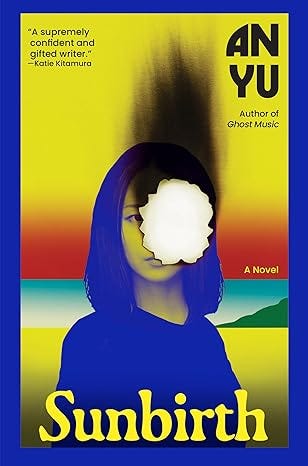Open to interpretation
Novels such as "Sunbirth" are like mood rings, revealing something different to each reader
Join us today, Wednesday, August 20, at 12:30 p.m. Eastern to discuss Sunbirth, by An Yu, our August Book Club selection. Tune in from your desktop at The Ink or from a phone or tablet with the Substack app. The Book Club is open to all supporting subscribers of The Ink.
Sunbirth, by An Yu, has yielded so many pleasures. I love its mysteriousness, its imagery and metaphor, its exquisite foodie details, and most of all, its profound contemplation of the nature of grief and loneliness, and, at the end, what’s truly important. We will have so many questions for An Yu when we host her for a conversation next Wednesday, August 27, at 12:30 p.m. Eastern. She will be joining us from her home in Hong Kong; for her, it will be the middle of the night, which feels strangely appropriate. We hope you’ll join us for this special event.
Your questions and insights about the book have been so illuminating. Often, they’ve prompted us to reconsider aspects of the novel. Reader Paula B. asked where Five Poems Lake residents get their supplies, given that they border on an uncrossable desert; others questioned what it means that 21st-century technology appears to be absent from the story. Some of you compared the book to The Twilight Zone or the work of Emily St. John Mandel.
But here’s a creative reading from Book Club member Teela Banker that really stopped us in our tracks: Teela wonders if An Yu is riffing on a story from Egyptian mythology, that of the god Amun-Ra. Amun was merely a local god associated with the air and wind. It wasn’t until he merged with the sun god, Ra, that he became Amun-Ra, the most powerful of all Egyptian gods.
In her reading, Teela suggests that Dong Yiyao (Ba, the vanished father of the book’s narrator, in merging with a Beacon (the missing student, Amu), becomes a sort of stand-in for Amun-Ra. Teela observes that he “was a sun for his daughters, a guiding star whose light had dimmed in the twelve years since his passing,” paralleling the disappearance of the sun itself. Further, she points out that, “in mourning the loss of someone we have loved, the world becomes dark — as if you’ve entered a tunnel of darkness.” So perhaps the Beacons are leading the way toward the light of day. In this way, Sunbirth is a novel not just about a sunless future, but about grief, loss, mourning, and acceptance.






